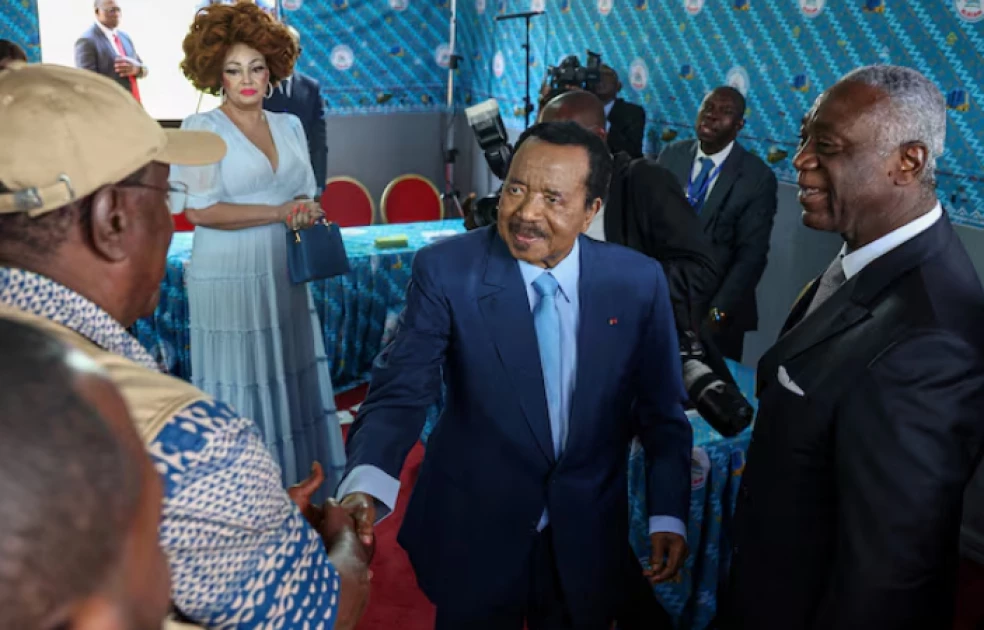Africa's ageing presidents govern world's youngest populations

Cameroonian President Paul Biya, 92, who is seeking an eighth term, shakes hands with election observer after castING his ballot while his wife Chantal looks on, during the presidential election in Yaounde, Cameroon October 12, 2025. REUTERS/Zohra Bensemra/File Photo

Audio By Vocalize
The presidents of Cameroon and Ivory Coast, 92 and 83
respectively, are each seeking to extend decades of rule, reflecting a trend
across Africa where some of the world's oldest leaders govern its youngest
populations, often leading to demands for change and accountability from
"Gen Z" youth.
Below are facts and figures about some of the continent's
oldest heads of state.
Biya has ruled since 1982, making him the world's oldest
serving head of state who is not a monarch. His tenure has been marked by
centralised governance and constitutional changes to extend his stay. Biya
could be declared the winner of the October 12 presidential election, though
opposition candidate Issa Tchiroma has declared victory, warning of potential
chaos in the nation of 30 million, where the median age is 19.
Savi de Tové assumed office last May under a constitutional
shift to a parliamentary system, becoming Togo's oldest president. The shift
allowed former president Faure Gnassingbe to continue to lead the government,
extending an unbroken dynastic tenure that began when his late father,
Gnassingbé Eyadéma, came to power in 1967 after a coup. Phosphate-producing
Togo has nearly 10 million people with a median age of 19.9 years.
Mutharika returned to power in October 2025 after a dramatic
political comeback. Malawi, a nation of 22.2 million with a median age of 18.8
years, is grappling with poverty and climate challenges, and calls have grown
for economic revival and governance reforms.
Ouattara has led Ivory Coast since 2010, steering
post-conflict recovery and economic growth. His controversial bid for a fourth
term in the October 25 election has been preceded by protest bans and arrests
and exclusions of opposition figures. Ivory Coast has a population of 33
million, with a median age of 18.3.
Obiang has ruled since 1979, making him the world's
longest-serving president. He has presided over an oil boom, which has now
peaked, and has been accused of corruption and rights abuses, allegations he
denies. As oil revenues decline, Equatorial Guinea's economy is shrinking. The
median age of its nearly 2 million people is 22.
Mnangagwa took power in 2017 after Robert Mugabe was ousted.
He has presided over economic turmoil, hyperinflation and allegations of
repression, which he denies. A push by his allies for a third term - beyond
constitutional limits - has sparked protests in the nation of 17 million, with
a median age of 18.
Sassou Nguesso has dominated Congolese politics since 1979,
apart from a period of civil war from 1992-97. His rule has been marked by
constitutional changes and allegations of electoral fraud, which he denies. The
oil-and-gas-producing nation has 6.5 million people, with a median age of 19.5.
Museveni has ruled Uganda since 1986, initially bringing
stability but later becoming synonymous with authoritarianism and crackdowns on
the opposition. Uganda's population is around 51 million, with a median age of
just 17.
Boakai became president of Liberia, a nation recovering from
civil wars, in January 2024 after defeating ex-footballer and incumbent George
Weah. Liberia has a population of 5.7 million, with a median age of 19.2.
Tebboune has led Algeria since 2019, focusing on fighting
corruption and diversifying the economy beyond oil and gas. Critics accuse him
of failing to deliver democratic renewal to open up power beyond a tightly-knit
elite. Algeria's 47 million people have a median age of 29.
Guelleh has led Djibouti's 1 million people since 1999,
exploiting its strategic location to attract foreign military bases and
investment. Despite economic gains, his government has been criticised for a
lack of political freedom. The median age is 26.
Tinubu became Nigeria's president in May 2023, pledging
economic reforms and anti-corruption measures. Inflation and insecurity bedevil
Africa's most populous country, where the median age of the 234 million people
is just 18.


Leave a Comment